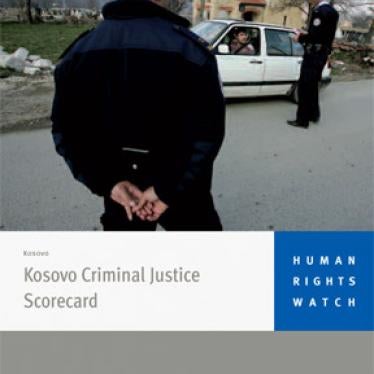Kosovo’s government should fully cooperate with the European Union’s newly deployed rule-of-law mission in reforming Kosovo’s criminal justice system that remains extremely weak, despite efforts to strengthen it over the past two years, Human Rights Watch said in a new report released today. The EU mission (known as “EULEX”) is expected to lead justice reform efforts. The riots in Mitrovica on March 17, 2008, underscore the need for Kosovo to build a strong and effective criminal justice system to deter, investigate and prosecute any such acts of violence.
“Kosovo’s criminal justice system is broken,” said Holly Cartner, Europe and Central Asia director at Human Rights Watch. “It’s in urgent need of fixing and that will take a real commitment by the government and the EU.”
The 34-page report, “Kosovo Criminal Justice Scorecard,” assesses progress in the justice system since the publication of a May 2006 Human Rights Watch report “Not on the Agenda: The Continuing Failure to Address Accountability in Kosovo Post-March 2004.”
The follow-up report concludes that there has been little progress on some of the key deficiencies in the system, including: inadequate police support for investigative prosecutors, poor coordination between the national and international elements of the system (in which international judges, prosecutors and police officers are supposed to work alongside their national counterparts), and an electronic case-management system that is still not operational, despite the millions of euros invested in it by various bilateral donors.
Witness protection is a particular problem, especially in cases involving organized crime, war crimes, and attacks on minorities. Widespread witness intimidation and harassment mean that many witnesses are unwilling to come forward. Kosovo lacks a witness protection law, and judges and prosecutors often fail to use those measures that are available. For witnesses in the most sensitive cases, relocation outside Kosovo is the only effective means of protection. Despite this, European states and the United States are reluctant to receive, or otherwise support, witnesses who need to be relocated from Kosovo.
“The EU’s decision to focus its efforts on the justice system is the right one,” said Cartner. “But unless EU states and the US are prepared to relocate and receive witnesses at risk, it will be next to impossible to prosecute individuals responsible for some of the most serious crimes.”
Other problems include insufficient oversight over the work of judges, prosecutors and the police, particularly the international contingent. The lack of transparency in the system and inadequate public outreach make it hard for the public to determine the effectiveness of the justice system.
Kosovo’s inadequate justice system has far-reaching consequences. In particular, many of Kosovo’s ongoing human rights problems, particularly ethnically and politically motivated violence such as anti-minority riots in 2004, can be traced back to the failure of the authorities to investigate, arrest and prosecute those committing the abuses.
“It won’t be easy building the rule of law in Kosovo,” said Cartner. “It depends on the ability to learn from past mistakes, and on the willingness of the government and the new international mission to police, prosecute, and punish criminal conduct, wherever and by whomever it is committed.”
The report contains concrete recommendations to the key justice system actors in Kosovo, including its government and the EU rule-of-law mission, including:
- Ensuring that the criminal justice system is fully integrated, with effective coordination between international and national judges, prosecutors, and police;
- Establishing a process for the Kosovo Police Service to provide investigative support to national and international prosecutors;
- Prioritizing the removal of obstacles to create an effective witness protection program that includes passing a witness protection law and a commitment by the EU, US and other states to accept witnesses at risk; and,
- Ensuring that all court employees learn and use the electronic case-management system.






